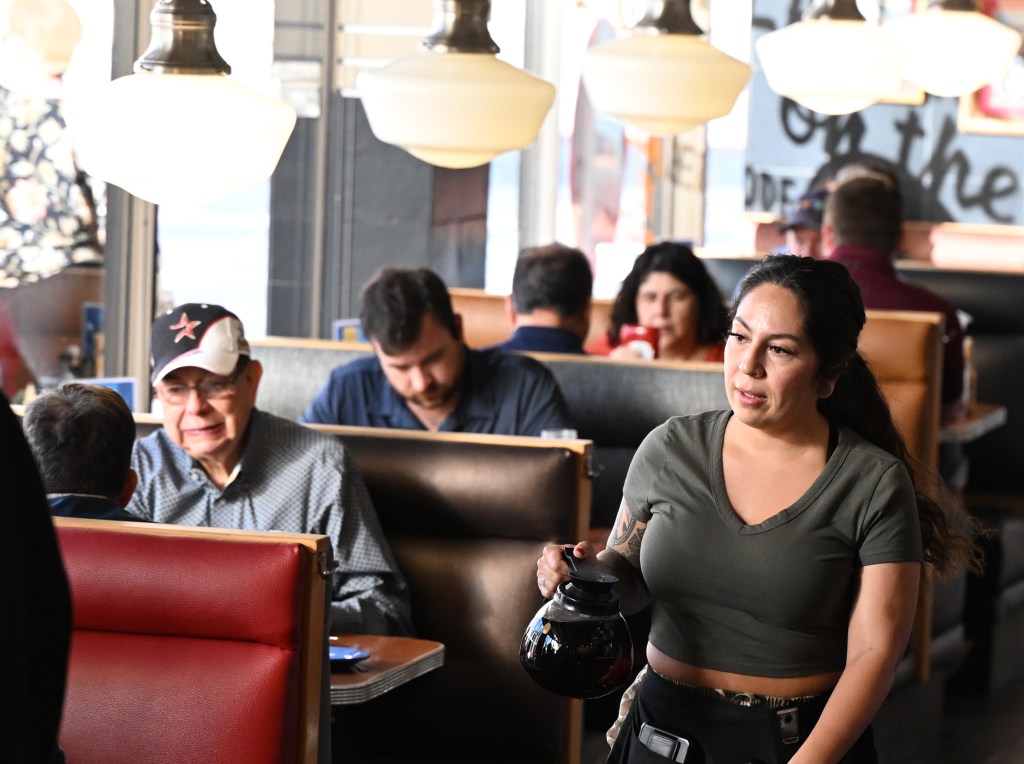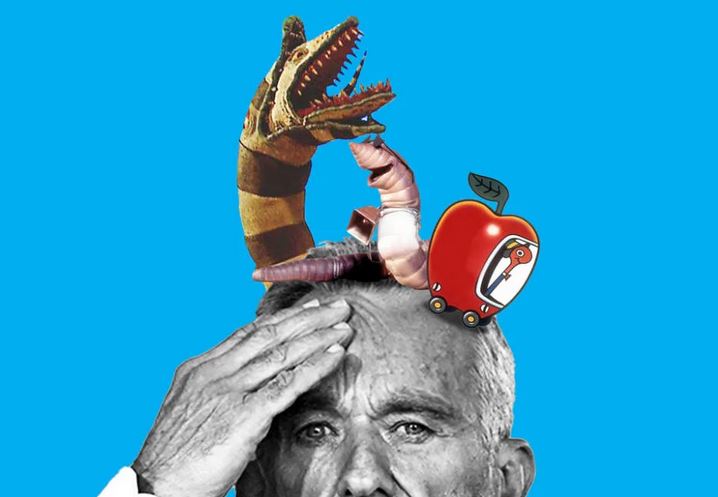Death to this asshole. This idiot sells $20 mocktails and owns like 6 restaurants.
Paging @LeylaLove@hexbear.net to correct me if I'm wrong.
In upscale restaurants, they prep most of their ingredients and components (sauces, etc.) onsite, and tend to have more experienced kitchen staff, meaning a lower food cost (fraction of the item's menu price that is taken up by buying ingredients from the distributor), and a higher labor cost per item. Dry goods tend to be relatively stable in price, their usage is stable and if anything they get relatively cheaper over time. Also, even without counting tips from waitstaff and correcting for direct (cook) and indirect (food cost) labor inputs, the upscale restaurant is less affordable for working-class people to eat at, largely because of higher profit margins. The people who eat there are the least squeezed people in the economy, and the least vulnerable to price shocks.
Established restaurants are lying out of their ass if they say they're "barely making it".
"Boohoo we can't survive if we can't cut our employees' real wages after inflation year after year"
L + Skill issue + Good riddance.
Nah you got everything right, upscale restaurants typically have higher margins and higher labor costs. Even at the restaurants that do actually get higher quality ingredients, they usually make up for this by serving smaller portions.The area where they squeeze the most out of you is alcohol. Get served 2 shots of pinnacle or McCormick's in a drink and pay $10 for each one.
There are 2 types of restaurants, ones that exist just to make people happy and ones that exist to make money. The ones that exist to make money are pretty much always doing fine. Petit bougois usually end up making some terrible deal with an investor and making it everyone else's problem instead of their own
These are well established and well known amongst Colorado rich people. Frasca has a Michelin star and is very well known (and good if you can afford it, so I've heard) and Tavernetta has a James Beard award and is perpetually packed. These are well known places that are regularly recognized for their quality. At least Tavernetta is at a train station so that's cool.
“We are the cornerstone species of the American economy,” Stuckey said of independent restaurants. “And these cities that are raising the minimum wage are about to torpedo that cornerstone species.”
Guy out here talking like they're wolves in Yellowstone.
https://archive.ph/ftP4w
Local news outlets are just advertisers / mouthpieces for local businesses huh? Seriously, how is this news otherwise? This is just some shitty small-business that isn't good enough to make it on their own, and they're having a moan about it.
In general, the US has too many shitty small businesses. Every pud who gets enough money at any point seems to try to start a business, and even in liberal terms I think it's clear that many aren't cut out for it, if only by looking at the sheer number of businesses that completely fail within the first ~5 years (about 50%).
I hate, hate, haaaaaaate local news because it's always been about "muh small business." Small business owner gets robbed. Small business gets vandalized. Small business this, small business that. Fuck off and tell me the weather.
And they never, EVER report on bad shit these kulak gusano fucks do unless it's a health code violation that poisons customers. Wage theft? Unsafe working conditions? Hahaha nope. That's not important news (even though it affects 99% of the population).
The Denver Post used to be a good, independent paper but it got bought by VC vultures who are taking the copper out of the walls.
Denver also used to have two papers, the Denver Post and the Rocky Mountain News.
Seen from the outside, Mara Gross takes an order from customers during the breakfast rush at Sam’s No. 3 diner in downtown Denver on Aug. 28, 2024. (Photo by RJ Sangosti/The Denver Post)
Colorado’s cost of living — driven largely by the heavy burden of housing costs — is making the state less attractive to businesses generally. Or at least that is what CNBC suggests in its 2024 ranking of states based on their business climates.
Colorado fell to 16th among states this year, down from 11th in 2023 and fourth in the cable news network’s 2022 rankings. The category that hurt the state the most was its cost of living, where the network ranked Colorado 46th out of the 50 states; Colorado also ranked poorly, at 39th, for cost of doing business.
Rachel Beck is the executive director of the Colorado Competitive Council, an offshoot of the Denver Metro Chamber of Commerce that lobbies for policies that support a strong economy and good jobs in the state.
The organization’s leaders know housing is driving business costs in Colorado, Beck said, but she argues that putting pressure on small businesses by mandating higher wages is not a workable solution. Instead, the state and local governments need to focus on drastically increasing housing supply.
“Proponents of minimum wage increases are very well-intentioned because, theoretically, it’s a way to ensure people have enough money to live in a given location,” Beck said. “But the increase in cost of housing has far outpaced wages. And instead, you end up with unintended consequences, like restaurants struggling to stay in business.”
Rising housing costs also are among the first things cited by proponents of Denver’s strong minimum wage when emphasizing its importance.
Aderaw Belay, a baggage handler and wheelchair agent at Denver International Airport, holds jobs with two contractors there and often works 16 hours days, not including commuting time.
A member of the Service Employees International Union, Belay says the $18.29 per hour he makes thanks to the city’s minimum wage is not life-changing money — it’s money he needs simply to survive when a one-bedroom apartment costs $1,500 a month. Most of his coworkers at the airport have similar stories, getting by with two or three jobs.
“Right now,” he said, “we are thinking about basic life. We are thinking about basic needs.”
“Constantly a challenge just to break even”
Progressive policy advocates have praised Denver’s higher minimum wage. Last year, the Colorado Fiscal Institute cited data compiled by the Colorado Department of Labor and Employment in arguing that it didn’t hurt Denver’s economic performance relative to the rest of the state in the first three years.
“Opponents of local minimum wage policies claim that such laws cause businesses to cut jobs, cut hours and pass the higher costs to consumers in higher prices, which can result in fewer purchases,” CFI senior economist Chris Stiffler wrote in a blog post in July 2023. But in Denver, compared to other cities, “unemployment was lower, weekly earnings increased, and sales tax collections all outpaced the rest of Colorado.”
But restaurant owners and other small business owners have reported more difficulties.
At the Colorado Competitive Council, Beck says having rigid minimum wage laws that cut across industries doesn’t account for the conditions and circumstances in each industry. Anecdotally, she hears that restaurants, in particular, respond to the challenge by cutting hours.
That is the case for Sam Armatas, vice president of Sam’s No. 3 diner, a family business with two locations, one in Denver and one in Glendale. Michael Cobey delivers food to customers as he waits tables during the breakfast rush at Sam's No. 3 diner in downtown Denver on Aug. 28, 2024. (Photo by RJ Sangosti/The Denver Post)Michael Cobey delivers food to customers as he waits tables during the breakfast rush at Sam’s No. 3 diner in downtown Denver on Aug. 28, 2024. (Photo by RJ Sangosti/The Denver Post)
That is the case for Sam Armatas, vice president of Sam’s No. 3 diner, a family business with two locations
IDK maybe don’t have Vice Presidents for a family-owned diner with two locations?
lmao what does a VP even do for a local chain? Do places with like 6 locations even have VPs? One of the franchises where I'm at with 5 locations recently had the owners get divorced. Each of them took two of the locations and they closed the 5th. As far as I know, they're the only "executives" employed at those places. Everyone else is on hourly wages.
Get fucked, benzona kalb of a settler petty bourgeois!
Restaurants churn almost as much as restaurant employees, why should anyone give a shit about some random restauranteur, it's not like they give a shit about their workers. Oh no your $20 eggs on the burger and garlic fries joint is going to go under. What a loss for the community.
the real funny part is that it probably won't go under. yeah some badly managed restaurants might. especially restaurants who are owned and/or managed by, say, an old guy or couple that just lacks vigor to keep the business going. but the lion's share is probably not suffering at all. their competition is fast food, and those joints are raising prices a bunch.
As the caps eat themselves the petit are shocked to find they are ground to meat with the rest. They were supposed to be better than us.











